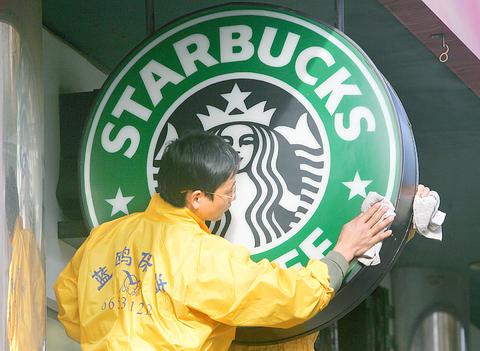A Chinese court has sided with the Starbucks coffee house chain in its battle with a Shanghai rival over their use of the same Chinese name, news reports said.
The dispute in China's rapidly expanding market for gourmet coffee highlights the country's struggle to mediate trademark disputes, a new concept for the communist legal system.
A Shanghai court ordered the Shanghai Xingbake Cafe Corp Ltd to stop using the name Xingbake, the name used in Chinese by Starbucks Corp, the Shanghai Daily and China Daily newspapers said. Xing, pronounced "shing," means star in Chinese, and bake, or "bah kuh," sounds like bucks.

PHOTO: AFP
The Shanghai No. 2 Intermediate People's Court said that the Shanghai firm engaged in "illegitimate competition" by using Starbucks' Chinese name and imitating the design of its cafes, the China Daily said.
Judge Lu Guoqiang's ruling on Saturday also ordered Shanghai Xingbake to pay Starbucks 500,000 yuan (US$62,000) in damages, the reports said.
Starbucks opened its first cafe in China in 1999. It later caused a stir by adding outlets in Beijing's imperial palace and at the Great Wall, north of the Chinese capital.
Foreign rivals and Chinese upstarts have jumped into the market to compete for well-heeled customers who pay up to 50 yuan (US$6) for a cup of coffee -- more than the average Chinese worker makes in a day.
Starbucks sued Shanghai Xingbake in 2003.
The Shanghai coffee house argued that its name was valid because it was registered in 2000, before Starbucks applied for its own Chinese trademark.
Starbucks rejected that, saying its name and mermaid trademark were registered in China beginning in 1996.
The Shanghai Daily report on Sunday said the Starbucks ruling was the first of its kind under a 2001 Chinese law meant to protect well-known international trademarks.
Starbucks' popularity has also prompted some Taiwanese coffee chains to mimic its logo and trademark. One of the alleged copycats, Penland Star Coffee (星半島), which translates as "star peninsula" in Chinese, attracted the attention of Starbucks when executives of the world's largest coffee retailer were surprised to spot its store sign during an inspection trip to Taiwan in September 2004.
"Whether any legal action has been or will be brought against Penland Star Coffee is the decision of US headquarters. As of now we haven't heard of any updates," said Bonnie Chao (
Foreign companies have complained for years that the Chinese government is failing to stamp out piracy of copyrighted or trademarked goods such as movies or designer clothes.
More recently, Chinese companies have begun to turn to the courts to protect their own names. A Shanghai soft drink maker, Yaqing Industry and Trade Co, lost a lawsuit last January against the Coca Cola Co and its local bottler over the name of a new beverage.
Additional reporting by Jackie Lin

CHIP WAR: The new restrictions are expected to cut off China’s access to Taiwan’s technologies, materials and equipment essential to building AI semiconductors Taiwan has blacklisted Huawei Technologies Co (華為) and Semiconductor Manufacturing International Corp (SMIC, 中芯), dealing another major blow to the two companies spearheading China’s efforts to develop cutting-edge artificial intelligence (AI) chip technologies. The Ministry of Economic Affairs’ International Trade Administration has included Huawei, SMIC and several of their subsidiaries in an update of its so-called strategic high-tech commodities entity list, the latest version on its Web site showed on Saturday. It did not publicly announce the change. Other entities on the list include organizations such as the Taliban and al-Qaeda, as well as companies in China, Iran and elsewhere. Local companies need

CRITICISM: It is generally accepted that the Straits Forum is a CCP ‘united front’ platform, and anyone attending should maintain Taiwan’s dignity, the council said The Mainland Affairs Council (MAC) yesterday said it deeply regrets that former president Ma Ying-jeou (馬英九) echoed the Chinese Communist Party’s (CCP) “one China” principle and “united front” tactics by telling the Straits Forum that Taiwanese yearn for both sides of the Taiwan Strait to move toward “peace” and “integration.” The 17th annual Straits Forum yesterday opened in Xiamen, China, and while the Chinese Nationalist Party’s (KMT) local government heads were absent for the first time in 17 years, Ma attended the forum as “former KMT chairperson” and met with Chinese People’s Political Consultative Conference Chairman Wang Huning (王滬寧). Wang

CROSS-STRAIT: The MAC said it barred the Chinese officials from attending an event, because they failed to provide guarantees that Taiwan would be treated with respect The Mainland Affairs Council (MAC) on Friday night defended its decision to bar Chinese officials and tourism representatives from attending a tourism event in Taipei next month, citing the unsafe conditions for Taiwanese in China. The Taipei International Summer Travel Expo, organized by the Taiwan Tourism Exchange Association, is to run from July 18 to 21. China’s Taiwan Affairs Office spokeswoman Zhu Fenglian (朱鳳蓮) on Friday said that representatives from China’s travel industry were excluded from the expo. The Democratic Progressive Party government is obstructing cross-strait tourism exchange in a vain attempt to ignore the mainstream support for peaceful development

DEFENSE: The US would assist Taiwan in developing a new command and control system, and it would be based on the US-made Link-22, a senior official said The Ministry of National Defense is to propose a special budget to replace the military’s currently fielded command and control system, bolster defensive resilience and acquire more attack drones, a senior defense official said yesterday. The budget would be presented to the legislature in August, the source said on condition of anonymity. Taiwan’s decade-old Syun An (迅安, “Swift Security”) command and control system is a derivative of Lockheed Martin’s Link-16 developed under Washington’s auspices, they said. The Syun An system is difficult to operate, increasingly obsolete and has unresolved problems related to integrating disparate tactical data across the three branches of the military,